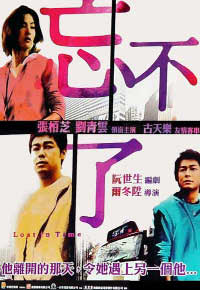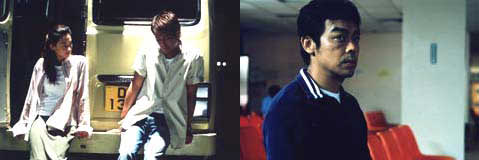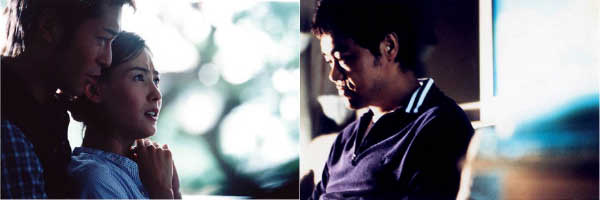Lost in Time

Reviewed by YTSL
Once upon a time, Derek Yee was best known as
a Shaw Brothers kung fu movie star. Some years later, he gained some
notoriety as the boyfriend of Maggie Cheung whose love letters some members
of the Hong Kong gutter press managed to dig up during one of their searches
through her garbage. Since the huge critical as well as commercial
success of “C’est la Vie, Mon Cheri”, however, this talented half-brother
of David Chiang and Paul Chun Pui -- who also has cinematography and producing
credits to his name -- is most famed for being the respected director of
hit dramas like that 1993 weepie which made major stars of Anita Yuen and
Lau Ching Wan along with “Full Throttle”, “The Truth about Jane and Sam”
and “Viva Erotica!”.

For much of 2002 and this year too, Derek Yee was involved in a dispute with
Filmko Productions that put him temporarily out of commission. Thus
it was that it’s only in late 2003 that the chairman of the Hong Kong Directors’
Association has come out with another quality directorial effort. After
viewing LOST IN TIME, I have little doubt that many Hong Kong filmophiles
will be glad to know that director Yee is very much back as well as feel
that they have ample proof that he’s not lost his ability to weave movie
magic out of subject matter that may seem rather mundane on paper but comes
across as admirably mature when projected onto a silver screen.

At the center of this soulful James Yuen and Fong Ching scripted drama that
deals with death, loss, life and responsibilities is a young woman whose
minibus driver fiancé (Louis Koo guest stars as Ah Man) was killed
in a traffic accident while she waited at the bus terminus one rainy evening
for him. Cecilia Cheung gives her best performance in a while as Siu
Wai (or Holly, as she is referred to in LOST IN TIME’s English subtitles),
the vulnerable appearing plus acting lass who now has to look after herself
and -- even while clearly having considerable difficulties doing just this
-- also takes it upon herself to care for Ah Man’s 5 year old son, Lok Lok
(The tousle-headed Harashima Daichi’s cute character gets named in the English
subtitles as Laurie).

After arranging for Ah Man’s minibus to be repaired, Siu Wai decides to become
the regular driver of this not especially wieldy vehicle. Even after
another minibus driver (Lau Ching Wan’s immensely “giving” character is known
as Hale in the English subtitles but can be heard being addressed as Dai
Fai on the film’s Cantonese track) comes along to render significant amounts
of aid in various departments though, she finds a lot of things -- and people
(ranging from her home truths-delivering sister to some unsavory customers
to uncharitable “colleagues” to Triads protecting certain patches) -- going
against her. So much is this the case that at one point in LOST IN
TIME, a financially in dire straits Siu Wai comes pretty close to deciding
that Lok Lok -- whose biological mother has never told her wealthy husband
that she had a child with someone else before they met -- would be better
off in an orphanage than with she who ended up being addressed as “Mummy”
rather than “Auntie” by the kid.
Lest it be thought that LOST IN TIME is all doom
and gloom though, here’s pointing out that this (re)viewer shed some tears
of laughter and relief as well as sorrow over the course of viewing this
affecting offering. All in all, the nicely lensed by Venus Keung production’s
comedy highlight sequence must surely be that which had Dai Fai giving Siu
Wai a demonstration of how to ensure that one’s minibus route will be profitable.
At the same time, the cinema audience I checked out the character plus actor
driven work with also reacted very positively plus audibly to the scene involving
Michael Chan (in a trademark Triad “dai lo” part) which started off as a
rather tense one but got increasingly giggle- plus chortle-inducing with
the intervention of successive female relatives into a business negotiation
that had Lok Lok as well as Siu Wai, Tai Fai and a third minibus driver in
attendance.

Additionally, there’s considerable relief to be garnered from it being so
that Siu Wai and Lok Lok turn out to not be as alone in the world as they
sometimes are apt to feel. While Dai Fai’s generous assistance plus
general presence is not to be discounted, others play their part too in helping
the traumatized Siu Wai pick up the pieces of what she probably thought was
a life that had been irrevocably broken by the premature death of a loved
one. In particular, I’d like to single out the unobtrusive efforts
of the effectively widowed woman’s parents (the male half of which is essayed
by the ever-dependable Paul Chun Pui) as well as state that the handling
of these supporting characters are among the aspects of LOST IN TIME that
I found to be wonderfully sensitive as well as thoughtful.
My rating for this film: 8.





